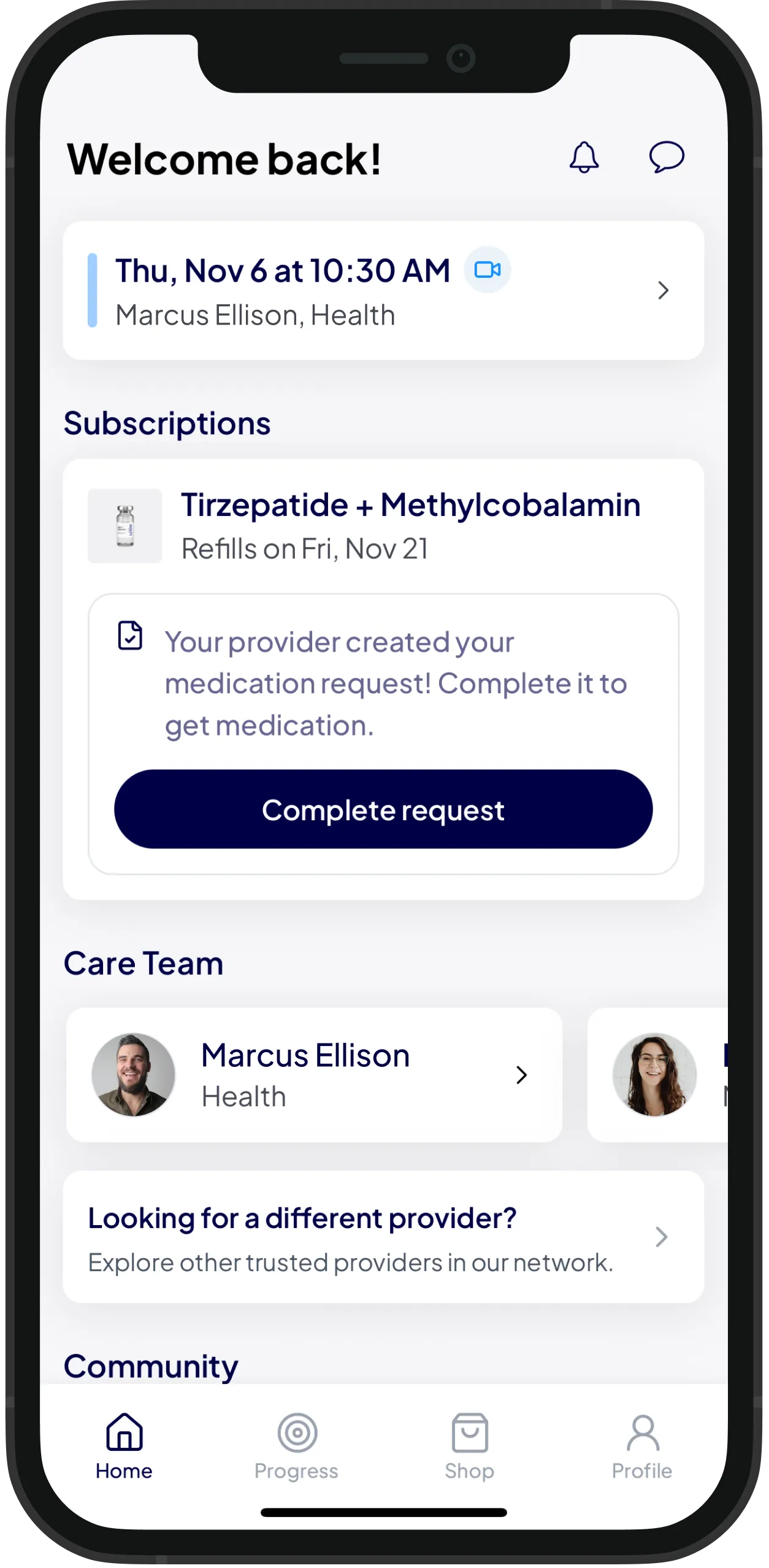Ready to transform your health?
Unlock access to expert guidance and a weight care plan crafted just for you.
Ready to transform your health?
Unlock access to expert guidance and a weight care plan crafted just for you.
Similar Articles
Similar Articles


How to Spot Fake Semaglutide: Safety Risks and Warning Signs
How to Spot Fake Semaglutide: Safety Risks and Warning Signs


Alternatives to BMI: Better Ways to Measure Health
Alternatives to BMI: Better Ways to Measure Health


Is Zofran Safe with Semaglutide? What You Need to Know
Is Zofran Safe with Semaglutide? What You Need to Know
How to Stop Stress Eating: Understanding Triggers and Taking Back Control
How to Stop Stress Eating: Understanding Triggers and Taking Back Control
How to Stop Stress Eating: Understanding Triggers and Taking Back Control
Struggling with stress eating? Discover expert tips from a weight loss psychologist to curb emotional eating, identify triggers, and regain control!
Struggling with stress eating? Discover expert tips from a weight loss psychologist to curb emotional eating, identify triggers, and regain control!
Struggling with stress eating? Discover expert tips from a weight loss psychologist to curb emotional eating, identify triggers, and regain control!



Table of Contents
Table of Contents
Table of Contents
How Stress Eating Makes Weight Loss Harder
Recognizing Your Triggers for Stress Eating
Practical Tips to Stop Stress Eating
Key Takeaways
How Stress Eating Makes Weight Loss Harder
Recognizing Your Triggers for Stress Eating
Practical Tips to Stop Stress Eating
Key Takeaways
How Stress Eating Makes Weight Loss Harder
Recognizing Your Triggers for Stress Eating
Practical Tips to Stop Stress Eating
Key Takeaways
Stress is a normal part of life, but for many people, it can lead to habits that make weight loss harder. One of the most common struggles is stress eating, turning to food for comfort during emotional times; but what is stress eating exactly?
Stress eating, also known as emotional eating, happens when you eat in response to emotions instead of hunger. It can be triggered by anxiety, frustration, boredom, sadness, or even happiness. For many, food becomes a way to self-soothe during difficult moments. In doing this we often develop associations and create a cycle that works against our weight loss efforts.
It important to remember that is not just emotions that are at play, but also biology. When we are stressed your body releases cortisol, a hormone that increases appetite and cravings for high-fat, high-sugar foods (1). Over time, stress eating can lead to unwanted weight gain and feelings of guilt or shame, making it even harder to stay motivated on a weight loss journey.
How Stress Eating Makes Weight Loss Harder
It Disrupts Your Hunger Cues
Stress eating often means eating when you’re not actually hungry. This can confuse your body’s natural hunger and fullness signals, leading to overeating and difficulty recognizing when you're truly full.
It Can Trigger a Weight Loss Plateau
If you’re working hard on your weight loss plan but not seeing results, stress eating could be a hidden factor. Even small, frequent snacks can lead to extra calories that slow down your progress and contribute to a weight loss plateau. This is especially true if stress eating leads to mindless eating rather than mindful eating.
Recognizing Your Triggers for Stress Eating
One of the most important steps in learning how to reduce stress eating is identifying your personal triggers. These can be emotional, environmental, or even social.
Emotional Triggers
Feelings of loneliness, anxiety, or anger often lead people to seek comfort in food. Reflecting on or “noticing” what you feel before you reach for a snack can help you pause and choose a different way to cope.
Environmental Triggers
Do you tend to snack while watching TV? Or eat more when you're working late? Certain settings or times of day can become automatic food cues. These are often called associations and it’s important to recognize these patterns as they can be associated with many things.
Social Triggers
Gatherings with friends or family can include pressure to eat or overindulge, even when you’re not hungry. Being aware of these situations can help you set boundaries and stay mindful.
Practical Tips to Stop Stress Eating
Practice a Mindful Eating Routine
Slowing down during meals and paying attention to how your body feels can help you tune back into hunger and fullness cues. Try eating without distractions and taking time to chew and enjoy each bite. Trying to aim for 20 minutes for meals can help with this tip (4).
Values based action
Rather than turning to food, create a list of go-to activities that help you relax or things that align with your interests. This might include taking a walk, listening to music, calling a friend, or practicing deep breathing. It can be helpful to engage in reflection to see if there are any activities that you might return to for enjoyment rather than turning to food.
Plan for High-Stress Times
If you know certain times will be more stressful, like evenings after work, prepare a healthy snack ahead of time or have a plan to unwind that doesn’t involve food.
Seek Support
Working with a health psychologist who specializes in weight loss therapy can make a big difference. They can help you understand the connection between emotions and eating, build healthier coping skills, and support long-term behavior change.
For personalized support on your health journey, consider exploring Mochi Health. With tailored guidance and expert resources, Mochi can help you take meaningful steps toward overcoming stress eating. Learn more here.
Weight Loss Motivation Through Self-Compassion
Being self-critical can make stress eating worse. Self-compassion is the other side of the coin, and it means recognizing that weight loss is a journey with ups and downs, and that slip-ups are normal. Remind yourself that progress takes time, and every step you take toward healthy coping is a step in the right direction.
Key Takeaways
Stress eating is common but manageable. Understanding your emotional and environmental triggers can help you stop stress eating before it starts.
Mindfulness and healthy routines make a difference. Practicing mindful eating and preparing for stressful moments helps reduce emotional eating.
Support is available. Weight loss therapy can provide the tools and guidance you need to manage emotional eating and reach your health goals. Access support with Mochi Health here.
Be kind to yourself. Motivation grows from realistic goals and self-compassion, not from guilt or pressure.
If you’re on a weight loss journey and struggling with stress eating, you’re not alone. This challenge is common, and it doesn’t mean you’re doing anything wrong. By understanding your triggers and practicing healthier coping, you can take control of your habits and make lasting changes. Whether you’re exploring medical weight loss options or working with a therapist, support is out there to help you succeed.
Managing stress eating is easier with the right tools and support. Mochi is here to help you every step of the way, offering expert guidance and personalized resources to achieve your health and wellness goals. Get started with Mochi Health today.
References:
Epel, E. S., Lapidus, R., McEwen, B., & Brownell, K. D. (2001). Stress may add bite to appetite in women: a laboratory study of stress-induced cortisol and eating behavior. Psychoneuroendocrinology, 26(1), 37-49. https://doi.org/10.1016/S0306-4530(00)00035-4
Harvard Health Publishing. (2020). Why stress causes people to overeat. Harvard Medical School. https://www.health.harvard.edu/staying-healthy/why-stress-causes-people-to-overeat
American Psychological Association. (2023). Mindfulness meditation: A research-proven way to reduce stress. https://www.apa.org/topics/mindfulness/meditation
Cleveland Clinic. (2023, March 29). Why do I eat so fast? Cleveland Clinic. https://health.clevelandclinic.org/why-do-i-eat-so-fast
Stress is a normal part of life, but for many people, it can lead to habits that make weight loss harder. One of the most common struggles is stress eating, turning to food for comfort during emotional times; but what is stress eating exactly?
Stress eating, also known as emotional eating, happens when you eat in response to emotions instead of hunger. It can be triggered by anxiety, frustration, boredom, sadness, or even happiness. For many, food becomes a way to self-soothe during difficult moments. In doing this we often develop associations and create a cycle that works against our weight loss efforts.
It important to remember that is not just emotions that are at play, but also biology. When we are stressed your body releases cortisol, a hormone that increases appetite and cravings for high-fat, high-sugar foods (1). Over time, stress eating can lead to unwanted weight gain and feelings of guilt or shame, making it even harder to stay motivated on a weight loss journey.
How Stress Eating Makes Weight Loss Harder
It Disrupts Your Hunger Cues
Stress eating often means eating when you’re not actually hungry. This can confuse your body’s natural hunger and fullness signals, leading to overeating and difficulty recognizing when you're truly full.
It Can Trigger a Weight Loss Plateau
If you’re working hard on your weight loss plan but not seeing results, stress eating could be a hidden factor. Even small, frequent snacks can lead to extra calories that slow down your progress and contribute to a weight loss plateau. This is especially true if stress eating leads to mindless eating rather than mindful eating.
Recognizing Your Triggers for Stress Eating
One of the most important steps in learning how to reduce stress eating is identifying your personal triggers. These can be emotional, environmental, or even social.
Emotional Triggers
Feelings of loneliness, anxiety, or anger often lead people to seek comfort in food. Reflecting on or “noticing” what you feel before you reach for a snack can help you pause and choose a different way to cope.
Environmental Triggers
Do you tend to snack while watching TV? Or eat more when you're working late? Certain settings or times of day can become automatic food cues. These are often called associations and it’s important to recognize these patterns as they can be associated with many things.
Social Triggers
Gatherings with friends or family can include pressure to eat or overindulge, even when you’re not hungry. Being aware of these situations can help you set boundaries and stay mindful.
Practical Tips to Stop Stress Eating
Practice a Mindful Eating Routine
Slowing down during meals and paying attention to how your body feels can help you tune back into hunger and fullness cues. Try eating without distractions and taking time to chew and enjoy each bite. Trying to aim for 20 minutes for meals can help with this tip (4).
Values based action
Rather than turning to food, create a list of go-to activities that help you relax or things that align with your interests. This might include taking a walk, listening to music, calling a friend, or practicing deep breathing. It can be helpful to engage in reflection to see if there are any activities that you might return to for enjoyment rather than turning to food.
Plan for High-Stress Times
If you know certain times will be more stressful, like evenings after work, prepare a healthy snack ahead of time or have a plan to unwind that doesn’t involve food.
Seek Support
Working with a health psychologist who specializes in weight loss therapy can make a big difference. They can help you understand the connection between emotions and eating, build healthier coping skills, and support long-term behavior change.
For personalized support on your health journey, consider exploring Mochi Health. With tailored guidance and expert resources, Mochi can help you take meaningful steps toward overcoming stress eating. Learn more here.
Weight Loss Motivation Through Self-Compassion
Being self-critical can make stress eating worse. Self-compassion is the other side of the coin, and it means recognizing that weight loss is a journey with ups and downs, and that slip-ups are normal. Remind yourself that progress takes time, and every step you take toward healthy coping is a step in the right direction.
Key Takeaways
Stress eating is common but manageable. Understanding your emotional and environmental triggers can help you stop stress eating before it starts.
Mindfulness and healthy routines make a difference. Practicing mindful eating and preparing for stressful moments helps reduce emotional eating.
Support is available. Weight loss therapy can provide the tools and guidance you need to manage emotional eating and reach your health goals. Access support with Mochi Health here.
Be kind to yourself. Motivation grows from realistic goals and self-compassion, not from guilt or pressure.
If you’re on a weight loss journey and struggling with stress eating, you’re not alone. This challenge is common, and it doesn’t mean you’re doing anything wrong. By understanding your triggers and practicing healthier coping, you can take control of your habits and make lasting changes. Whether you’re exploring medical weight loss options or working with a therapist, support is out there to help you succeed.
Managing stress eating is easier with the right tools and support. Mochi is here to help you every step of the way, offering expert guidance and personalized resources to achieve your health and wellness goals. Get started with Mochi Health today.
References:
Epel, E. S., Lapidus, R., McEwen, B., & Brownell, K. D. (2001). Stress may add bite to appetite in women: a laboratory study of stress-induced cortisol and eating behavior. Psychoneuroendocrinology, 26(1), 37-49. https://doi.org/10.1016/S0306-4530(00)00035-4
Harvard Health Publishing. (2020). Why stress causes people to overeat. Harvard Medical School. https://www.health.harvard.edu/staying-healthy/why-stress-causes-people-to-overeat
American Psychological Association. (2023). Mindfulness meditation: A research-proven way to reduce stress. https://www.apa.org/topics/mindfulness/meditation
Cleveland Clinic. (2023, March 29). Why do I eat so fast? Cleveland Clinic. https://health.clevelandclinic.org/why-do-i-eat-so-fast
Stress is a normal part of life, but for many people, it can lead to habits that make weight loss harder. One of the most common struggles is stress eating, turning to food for comfort during emotional times; but what is stress eating exactly?
Stress eating, also known as emotional eating, happens when you eat in response to emotions instead of hunger. It can be triggered by anxiety, frustration, boredom, sadness, or even happiness. For many, food becomes a way to self-soothe during difficult moments. In doing this we often develop associations and create a cycle that works against our weight loss efforts.
It important to remember that is not just emotions that are at play, but also biology. When we are stressed your body releases cortisol, a hormone that increases appetite and cravings for high-fat, high-sugar foods (1). Over time, stress eating can lead to unwanted weight gain and feelings of guilt or shame, making it even harder to stay motivated on a weight loss journey.
How Stress Eating Makes Weight Loss Harder
It Disrupts Your Hunger Cues
Stress eating often means eating when you’re not actually hungry. This can confuse your body’s natural hunger and fullness signals, leading to overeating and difficulty recognizing when you're truly full.
It Can Trigger a Weight Loss Plateau
If you’re working hard on your weight loss plan but not seeing results, stress eating could be a hidden factor. Even small, frequent snacks can lead to extra calories that slow down your progress and contribute to a weight loss plateau. This is especially true if stress eating leads to mindless eating rather than mindful eating.
Recognizing Your Triggers for Stress Eating
One of the most important steps in learning how to reduce stress eating is identifying your personal triggers. These can be emotional, environmental, or even social.
Emotional Triggers
Feelings of loneliness, anxiety, or anger often lead people to seek comfort in food. Reflecting on or “noticing” what you feel before you reach for a snack can help you pause and choose a different way to cope.
Environmental Triggers
Do you tend to snack while watching TV? Or eat more when you're working late? Certain settings or times of day can become automatic food cues. These are often called associations and it’s important to recognize these patterns as they can be associated with many things.
Social Triggers
Gatherings with friends or family can include pressure to eat or overindulge, even when you’re not hungry. Being aware of these situations can help you set boundaries and stay mindful.
Practical Tips to Stop Stress Eating
Practice a Mindful Eating Routine
Slowing down during meals and paying attention to how your body feels can help you tune back into hunger and fullness cues. Try eating without distractions and taking time to chew and enjoy each bite. Trying to aim for 20 minutes for meals can help with this tip (4).
Values based action
Rather than turning to food, create a list of go-to activities that help you relax or things that align with your interests. This might include taking a walk, listening to music, calling a friend, or practicing deep breathing. It can be helpful to engage in reflection to see if there are any activities that you might return to for enjoyment rather than turning to food.
Plan for High-Stress Times
If you know certain times will be more stressful, like evenings after work, prepare a healthy snack ahead of time or have a plan to unwind that doesn’t involve food.
Seek Support
Working with a health psychologist who specializes in weight loss therapy can make a big difference. They can help you understand the connection between emotions and eating, build healthier coping skills, and support long-term behavior change.
For personalized support on your health journey, consider exploring Mochi Health. With tailored guidance and expert resources, Mochi can help you take meaningful steps toward overcoming stress eating. Learn more here.
Weight Loss Motivation Through Self-Compassion
Being self-critical can make stress eating worse. Self-compassion is the other side of the coin, and it means recognizing that weight loss is a journey with ups and downs, and that slip-ups are normal. Remind yourself that progress takes time, and every step you take toward healthy coping is a step in the right direction.
Key Takeaways
Stress eating is common but manageable. Understanding your emotional and environmental triggers can help you stop stress eating before it starts.
Mindfulness and healthy routines make a difference. Practicing mindful eating and preparing for stressful moments helps reduce emotional eating.
Support is available. Weight loss therapy can provide the tools and guidance you need to manage emotional eating and reach your health goals. Access support with Mochi Health here.
Be kind to yourself. Motivation grows from realistic goals and self-compassion, not from guilt or pressure.
If you’re on a weight loss journey and struggling with stress eating, you’re not alone. This challenge is common, and it doesn’t mean you’re doing anything wrong. By understanding your triggers and practicing healthier coping, you can take control of your habits and make lasting changes. Whether you’re exploring medical weight loss options or working with a therapist, support is out there to help you succeed.
Managing stress eating is easier with the right tools and support. Mochi is here to help you every step of the way, offering expert guidance and personalized resources to achieve your health and wellness goals. Get started with Mochi Health today.
References:
Epel, E. S., Lapidus, R., McEwen, B., & Brownell, K. D. (2001). Stress may add bite to appetite in women: a laboratory study of stress-induced cortisol and eating behavior. Psychoneuroendocrinology, 26(1), 37-49. https://doi.org/10.1016/S0306-4530(00)00035-4
Harvard Health Publishing. (2020). Why stress causes people to overeat. Harvard Medical School. https://www.health.harvard.edu/staying-healthy/why-stress-causes-people-to-overeat
American Psychological Association. (2023). Mindfulness meditation: A research-proven way to reduce stress. https://www.apa.org/topics/mindfulness/meditation
Cleveland Clinic. (2023, March 29). Why do I eat so fast? Cleveland Clinic. https://health.clevelandclinic.org/why-do-i-eat-so-fast
Read next
Ready to transform your health?
Unlock access to expert guidance and a weight care plan crafted just for you.

Ready to transform your health?
Unlock access to expert guidance and a weight care plan crafted just for you.

Ready to transform your health?
Unlock access to expert guidance and a weight care plan crafted just for you.


© 2026 Mochi Health
All professional medical services are provided by licensed physicians and clinicians affiliated with independently owned and operated professional practices. Mochi Health Corp. provides administrative and technology services to affiliated medical practices it supports, and does not provide any professional medical services itself.


© 2026 Mochi Health
All professional medical services are provided by licensed physicians and clinicians affiliated with independently owned and operated professional practices. Mochi Health Corp. provides administrative and technology services to affiliated medical practices it supports, and does not provide any professional medical services itself.


© 2026 Mochi Health
All professional medical services are provided by licensed physicians and clinicians affiliated with independently owned and operated professional practices. Mochi Health Corp. provides administrative and technology services to affiliated medical practices it supports, and does not provide any professional medical services itself.


















